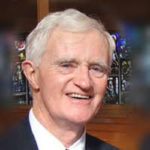Sydney needs a new archbishop who has every chance of becoming a cardinal once Cardinal Pell turns 80. How do we get a new bishop?
The pope will appoint one. Since 1917 he has claimed the right to do so. History is not on the side of that claim – but that is another story.
Today’s official method is for bishops to send recommendations to the Papal Nuncio. When a diocese becomes open the nuncio does a search, checks these recommendations, and makes a list of three suggestions. This is called a “terna”. He sends it to the Congregation of Bishops in Rome – the papal personnel department. The bureaucrats of that department do their own checking and prepare the agenda for the Congregation. There are about 30 cardinals who are members of the Congregation – some live in Rome and would regularly attend; others are spread round the world and attend when they choose. The Congregation meets fortnightly, discusses the matter and sends a list of three to the pope for his approval and appointment. The pope normally takes the first name on the list.
It seems a clear process. Not so. Patronage plays a part at every level. The bishops sometimes consult before sending their list to the nuncio but ultimately they suggest their favourites. The nuncio can take notice of those lists or not. The nunciature’s staff can have their input. The final terna that goes to Rome is his selection. The desk men in the Congregation’s bureaucracy can also influence the outcome.
The cardinals who are members of the Congregation for Bishops have more or less influence on the recommendation depending on their degree of influence in the discussion room. They could make their own suggestions or bad mouth someone they do not like. So if you want promotion get into the good books of your bishop – or the nuncio’s . Even better if you have influence with members of the Congregation. In this process it is who you know, not what you know, that makes all the difference. So, bishops are usually the most ambitious priests rather than the most appropriate priests for the job.
Since the pope makes the final choice he can influence the process by his policies. During the 34 years of John Paul II and Benedict XVI, nuncios were instructed to sift out anyone who did not positively support papal policies on contraception, divorce, homosexuality, feminism, liberation theology and clerical dress. The result was a worldwide episcopate of ideological or conformist bishops. In order to maintain ideological purity the process included an ever increasing number of priests from religious orders with no experience in leading dioceses.
Appointments have been getting very slow. The Roman bureaucracy does not work at a frenetic pace. Still, their job is getting harder because of the growing shortage of priests of any kind, let alone potential bishops. The days of big numbers of high quality priests are long past. The heyday of seminary recruitment was 1950 to 1990. The youngest of this group is now in his 50s Furthermore, many priests see appointment as a bishop to be a poisoned chalice and knock back an offer.
Pope Francis is setting new criteria for bishops. Pastoral priests, not apparatchiks; broad minded priests, not ideologues. Anyone who is ambitious for episcopate or episcopal promotion should not get it. But will these criteria be followed?
Sydney’s appointment is important by anyone’s standards. If you want to back a winner find out who the kingmakers are, who they know and who they like. Here are a few facts to help you work it out. The outgoing archbishop, Cardinal Pell, will be consulted both formally and informally. Furthermore he is a member of the Congregation for Bishops and presumably will attend regularly when resident in Rome. He has always been a regular visitor to Rome and more so in the last year since he is on the Pope’s advisory Group of 8 cardinals. He has a permanent apartment at Domus Australia in Rome. He will be influential in his replacement.
He has been the promoter of Anthony Fisher, Bishop of Parramatta.
He indirectly advanced Mark Coleridge’s career by offering him for work in the Secretariat of State. He may have had mixed reasons for this. The cardinal prefects of the Roman Congregations find it hard to get good men. They tend to rely of personal contacts. So Cardinal Pell would have got brownie points by offering Mark Coleridge to the Cardinal Secretary of State. While Mark was working in Rome Archbishop Re was a deputy of the department and in 2000 became prefect of the Congregation for Bishops. Mgr. Parolin was an important specialist in the Congregation at that time. In 2009 he went to Venezuela as Nuncio and was called from there to be Secretary of State by Pope Francis. Contacts everywhere. What part these contacts will play remain to be seen.
Archbishop Wilson of Adelaide is 63 – old by secular, corporate standards, but a suitable age in a gerontocracy. He has been elected Chairman of the Australian Bishops Conference twice. Then there is always the possibility of a wild card introduced by someone somewhere in the system. Maybe Frank Brennan S.J. born exactly 60 years ago will get the nod.
Eric Hodgens is a retired Melbourne Catholic priest who ‘writes a bit’.




